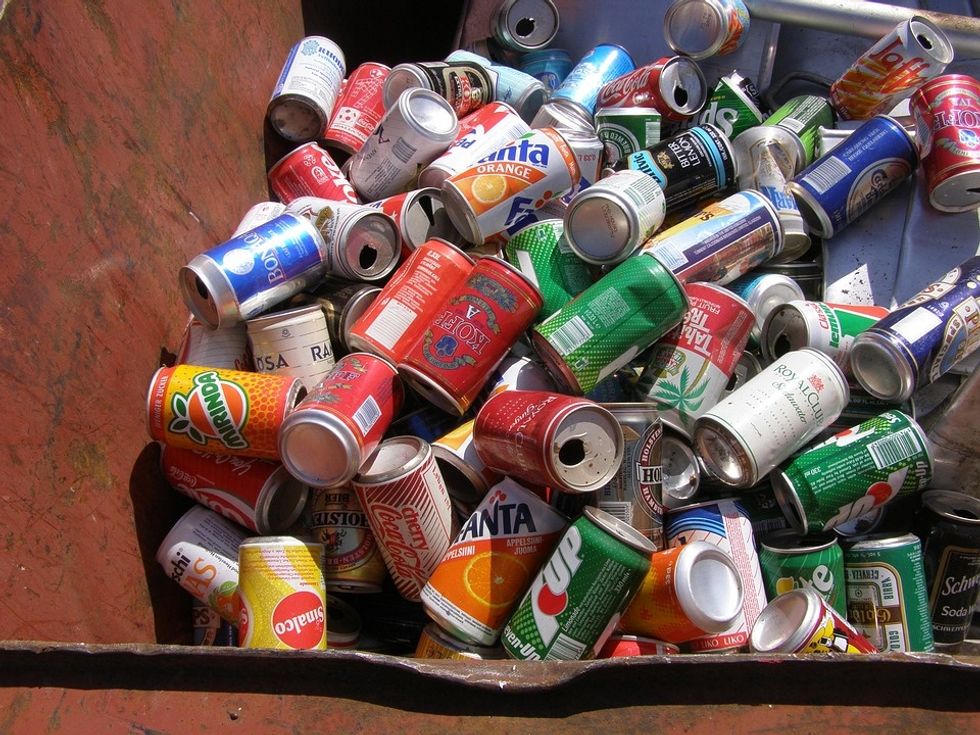You know those perfect summer mornings where you wake up at the right time, you're in your favorite mood and you just feel on top of the world? That was me last Friday. I was on my porch watching the chipmunks in my parent's yard, sipping on my iced coffee I picked up from my favorite coffee place downtown and didn't have a care in the world. That was until I went to dispose of the plastic cup my coffee came in. It's recyclable, right?
This summer I have been consciously trying to live a more sustainable life, reducing my own personal waste, but also becoming totally aware of all the waste being produced by everyone at every turn. One observation I have made is despite all the use of plastics and other non-biodegradable materials, the United States does a pretty good job of recycling, or so I thought. When I walk around downtown areas I notice recycling bins as an option next to trash cans, and my city, alike most other cities nation-wide, picks up a big recycling bin from our house every week that is almost full; full of glasses, metals, and plastics – often including those plastic coffee cups from my summer mornings.
My bubble was burst however, when I started looking into where those plastic coffee cups go after they leave my recycle bin. According to the EPA, 75 percent of the waste produced in the United States is recyclable, but only 34 percent of it gets put into recycle bins. In a video done by Now This News, of that 34 percent, only about 21 percent is actually recyclable due to people putting incorrect and contaminated items into their recycling bins. Plastic bags are a common item people mistakenly recycle, as well as unwashed bottles and containers. When you recycle a container, or any material, you need to triple rinse it so that it is completely clean as well as remove the cap, otherwise it cannot be recycled.
According to the NPR economist podcast, Planet Money the reason for recycling having so many loopholes all goes back to China. Up until 2017 China was responsible for the majority of the world's recycling, turning things like plastic water bottles into polyester socks. In 2017, China declared they were tired of being the "world's garbage dump" and decided they would no longer accept all the unsorted, dirty plastic they were receiving from all over the world. Back in the U.S., this new policy has created a problem for recycling centers who relied on selling their recyclable materials to China. There are warehouses across the country that are literally stacked full of recyclable material that have no where to go. Owners of these recycling centers have been given little options. They can either pay to have their collected materials recycled; costing them about $200 per ton, or for $30 a ton can send it to landfills. Therefor, the majority of recyclable goods are getting sent to landfills.
As in every story, there is a silver lining in all this. These recycling centers are doing all they can to make materials have second lives. China still does accept recycled goods, just with higher standards, limiting the amount of materials they accept. Countries like India are starting to replace China's previous role as the world's garbage dump and are beginning to form a system for accepting recycled material in any form no matter how gross the condition.
When it comes to my iced coffee cup the economists from Planet Money say it's actually more environmentally friendly to throw my cup in the trash than it is for me to put it in the recycling. They argue that by the time I use water to rinse it out, gas and energy for it to be transported by truck, train, and possibly boat to get to a recycling center where it has a chance of being thrown out anyways, it's not worth it. I don't like that resolution. I have viewed recycling as this saving back bone in our society that makes up for the times when I can't avoid using plastic and other wasteful materials. Now that I understand the brokenness of the system, I realize that backbone isn't really there for us. That does not mean I need to throw my iced coffee cups in the trash, but instead means that I have a duty to bring a reusable cup from home. Consuming in a world of plastic requires choices and responsibility. First, the choice whether or not to buy the plastic. Second what to do with the plastic once I've used it.
My perfect summer morning no longer includes that choice between the garbage and recycling, because I was able to shift that choice to a forward thought instead of an after thought; choosing what size glass jar I am going to bring with me.












